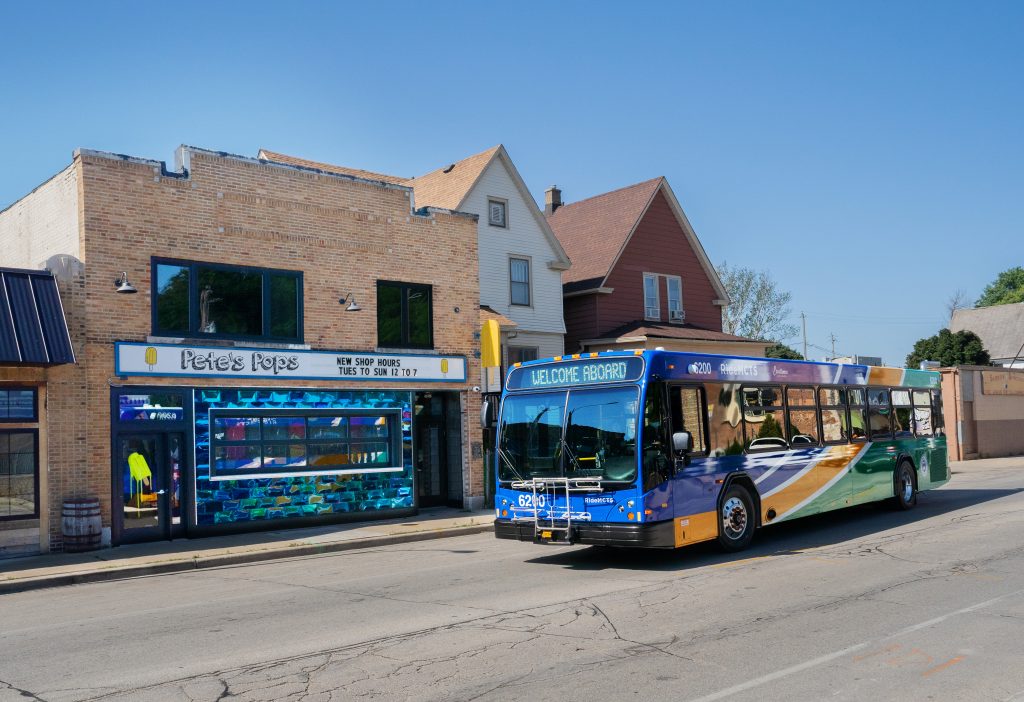County Races to Replace Aging Bus Fleet
Transportation officials pursue replacement of 30 buses in 2024.

New Gillig Clean-Diesel Bus. Photo Courtesy of MCTS.
The Milwaukee County Transit System (MCTS) operates nearly 100 buses considered near or beyond the end of their useful life.
The Milwaukee County Department of Transportation, which oversees the quasi-governmental transit system and county highways, is going after funding to replace 30 buses in the 2024 county budget. Donna Brown-Martin, MCDOT Director, recently told a county committee that approximately 90 new buses may be needed over the next couple of years as many run past federal guidelines for the lifespan of a bus: 12 years or 500,000 miles.
Brittany Bertsch, an MCTS project manager, explained to the Capital Improvements Committee (CIC) that the budget request is only $4.2 million, which would cover the local match of federal funding for bus replacements.
The CIC rates infrastructure and maintenance projects for inclusion in the county budget. Brown-Martin said the 2024 funding is “really, really important” to stay on schedule for bus replacements.
“You don’t want to wait until that timeframe in which they’re running down and in a position in which both the motors and the equipment are failing,” she said.
In 2009, the county received funding through a federal stimulus bill responding to the global financial crisis. Brown-Martin said the county managed to replace nearly all of its buses that were at that point beyond their useful life.
The county has not been replacing transit system buses at a one-to-one rate. The fleet has dwindled from 400 in 2018 to 321 at the start of 2023. The shrinking bus fleet is one of the reasons MCTS was forced to reduce its Summerfest shuttle service.
Part of the problem, as the Wisconsin Policy Forum laid out in a recent report, is that the transit system has been using funding intended for capital costs like bus replacement to backfill the cost of operating the system. The federal government has not provided mass-transit operating assistance since the 1990s and the transit system has a structural deficit that will resurface in 2025 when federal COVID-19 stimulus funds run out.
Union Doesn’t Like New Gillig Buses
Many bus operators do not like the new clean-diesel buses the transit system has been purchasing for bus replacements, according to the local transit union.
In April, Donnell Shorter, president of the Amalgamated Transit Union (ATU) Local 998, told the county’s board’s Committee on Transportation and Transit that many operators hate driving the system’s Gillig buses and will sometimes call in sick to avoid driving one. Shorter said the Gillig buses are ergonomically poor, and painful to sit in all day. He said the drum brakes also don’t stop as well as the disc brakes on the old bus.
MCTS has been purchasing clean-diesel buses manufactured by the California manufacturer Gillig since 2019. The older buses were made in Minnesota by the Canadian manufacturer New Flyer.
The new buses have been the Gillig 6100 and 6200 series, which provide “improved fuel economy, lower emissions, optimized driver visibility, anti-slip flooring, easier-to-read digital display signs, and a stainless-steel understructure designed to reduce salt corrosion,” according to MCTS.
If you think stories like this are important, become a member of Urban Milwaukee and help support real, independent journalism. Plus you get some cool added benefits.
MKE County
-
Fellow Judge Testifies in Dugan Case
 Dec 16th, 2025 by Graham Kilmer
Dec 16th, 2025 by Graham Kilmer
-
Key Questions in Dugan Trial Take Shape on First Day
 Dec 15th, 2025 by Graham Kilmer
Dec 15th, 2025 by Graham Kilmer
-
FTA Tells Milwaukee to Crack Down on Fare Evasion — Even Where Fares Don’t Exist
 Dec 12th, 2025 by Graham Kilmer
Dec 12th, 2025 by Graham Kilmer
Transportation
-
Congestion Pricing Cuts Air Pollution in New York City
 Dec 14th, 2025 by Jeff Wood
Dec 14th, 2025 by Jeff Wood
-
FTA Tells Milwaukee to Crack Down on Fare Evasion — Even Where Fares Don’t Exist
 Dec 12th, 2025 by Graham Kilmer
Dec 12th, 2025 by Graham Kilmer
-
Will GOGO’s Bus Service Ever Get Going?
 Dec 9th, 2025 by Jeramey Jannene
Dec 9th, 2025 by Jeramey Jannene






















MCTS bought a Gillig buses in the early 90s and they were poor performers, I was surprised when MCTS gave them another try after so many years of New Flyer purchases.
Calling in sick seems like an ineffective way to deal with a grievance. ATU and management need to work on this – nobody wants to ride in a bus where the driver is uncomfortable.
New Flyer is based in Winnipeg, Manitoba, Canada. They own the factory in Minnesota to meet made-in-US requirements.
Would smaller busses be less expensive to buy & operate?